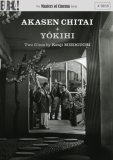![Late Mizoguchi - Eight Films 1951-1956 [Masters of Cinema] [DVD]](/pictures/1105743.jpg) Late Mizoguchi - Eight Films 1951-1956 | DVD | (24/01/2011)
from £N/A
| Saving you £N/A (N/A%)
| RRP
Late Mizoguchi - Eight Films 1951-1956 | DVD | (24/01/2011)
from £N/A
| Saving you £N/A (N/A%)
| RRP Kenji Mizoguchi looms over the history not only of Japanese cinema - but of world cinema altogether. These eight films from the last decade of Mizoguchi's career represent a collection of eight of his greatest works which is to say eight of the greatest films ever made. Oy-sama (1951) is an adaptation of Tanizaki Jun'ichir: a poignant tale of two sisters and their ill-fated relationship with the same man: a tale of the social mores and affairs of the heart that might destroy siblings. Ugetsu monogatari (1953) a ghost-tale par excellence and one of the most highly acclaimed works of the cinema is an intensely poetic sublimely lyrical tragedy of men lured away from their wives which consistently features on polls of the best films ever made. Gion-bayashi (1953) is a drama set in the world of the geisha a subtle masterwork that yields myriad insights into the lives of Japan's service-class in the early '50s. Sansh-day (1954) recounts an unforgettably sad story of the 11th century involving kidnapping and indentured servitude - and figures again with its exquisite tone and purity of emotion as one of the most critically revered films of any era. Uwasa no onna (1954) another Mizoguchi picture set in a modern geisha house pits mother against daughter with the ensuing drama forcing both to confront their attitudes toward family and business in what is one of the filmmaker's most astute filmic examinations of oppressed femininity. Chikamatsu monogatari (1954) the tragic story of a forbidden love affair between a merchant's wife and her husband's employee was hailed by the legendary Akira Kurosawa as a great masterpiece that could only have been made by Mizoguchi. Ykihi (1955) recounts an 8th-century Chinese story of a widowed emperor and his imperial concubine filmed in sumptuous hallucinatory Agfa-stock colour. Akasen-chitai (1956) aka Street of Shame is Mizoguchi's final masterpiece and one of the greatest last films ever made depicting the goings-on in a Tokyo brothel carrying the name Dreamland where dreams are nevertheless shattered beneath the weight of financial necessity and all questions of conscience - a last testament which inspired the great French critic Jean Douchet to proclaim: For me along with Chaplin's Monsieur Verdoux and Renoir's La Rgle du jeu the greatest film in the history of the cinema.
![Kisses [2007]](/pictures/1070951.jpg) Kisses | DVD | (23/07/2007)
from £24.99
| Saving you £-5.00 (N/A%)
| RRP
Kisses | DVD | (23/07/2007)
from £24.99
| Saving you £-5.00 (N/A%)
| RRP Masmura's debut feature with its stripped down narrative and handheld camerawork sent a shock wave through Japanese cinema in much the same manner as Godard in Europe. With its liberated camera and even more liberated protagonists this is the film which caused Oshima to say of Masumura ""a powerful irresistible force has arrived in Japanese Cinema."" A young boy and girl meet while visiting their respective fathers in prison. The young lovers soon embrace both each other and their mu
 Akasen Chitai/Yokihi | DVD | (26/05/2008)
from £N/A
| Saving you £N/A (N/A%)
| RRP
Akasen Chitai/Yokihi | DVD | (26/05/2008)
from £N/A
| Saving you £N/A (N/A%)
| RRP Filmed shortly before the Japanese government's introduction of an anti-prostitution bill Akasen Chitai is a compelling study of women torn between financial necessity and questions of conscience. It was nominated for the prestigious Golden Lion at the Venice Film Festival and inspired French critic Jean Douchet to proclaim: ""For me along with Chaplin's Monsieur Verdoux and Renoir's La Rgle du Jeu the greatest film in the history of cinema"". Set many centuries earlier Yokihi [Imperial Concubine Yang aka Yang Kwei Fei] recounts the Chinese legend referred to in its title. In eighth-century T'ang China widowed Emperor Hsan-tsung (Masayuki Mori) reigns alone devoting his life to the composition of music. When he meets and falls in love with a beautiful young woman (Machiko Kyo) who will become his imperial concubine a tale of political intrigue and rival dynasties is set in motion with ultimately tragic consequences. Sumptuously filmed in vibrant colour Yokihi is the most ancient of Mizoguchi's costume dramas yet its central themes of passion sorrow and the conflict between love and power remain timeless - it was also nominated for the Golden Lion at Venice.

Please wait. Loading...
This site uses cookies.
More details in our privacy policy